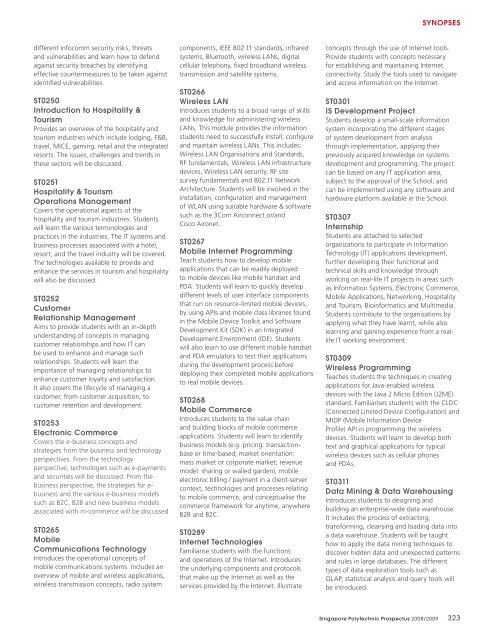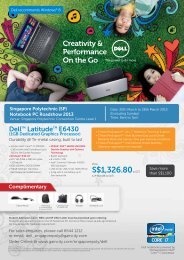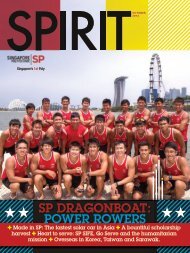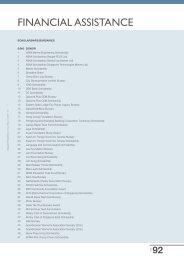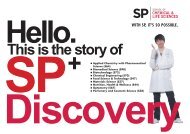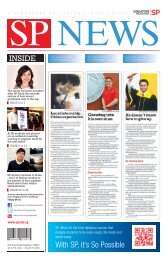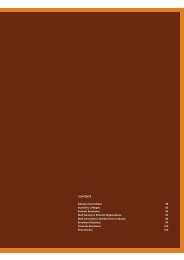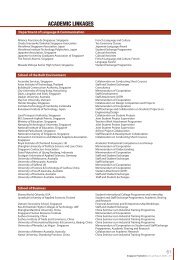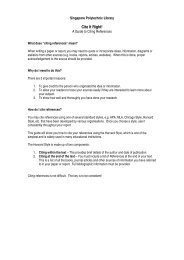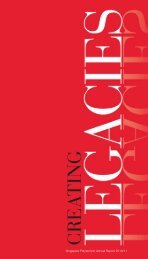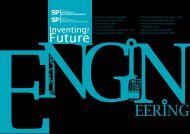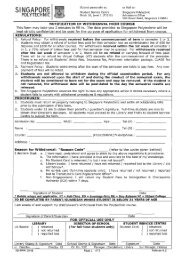SYNOPSES - Singapore Polytechnic
SYNOPSES - Singapore Polytechnic
SYNOPSES - Singapore Polytechnic
Create successful ePaper yourself
Turn your PDF publications into a flip-book with our unique Google optimized e-Paper software.
<strong>SYNOPSES</strong>different infocomm security risks, threatsand vulnerabilities and learn how to defendagainst security breaches by identifyingeffective countermeasures to be taken againstidentified vulnerabilities.ST0250Introduction to Hospitality &TourismProvides an overview of the hospitality andtourism industries which include lodging, F&B,travel, MICE, gaming, retail and the integratedresorts. The issues, challenges and trends inthese sectors will be discussed.ST0251Hospitality & TourismOperations ManagementCovers the operational aspects of thehospitality and tourism industries. Studentswill learn the various terminologies andpractices in the industries. The IT systems andbusiness processes associated with a hotel,resort, and the travel industry will be covered.The technologies available to provide andenhance the services in tourism and hospitalitywill also be discussed.ST0252CustomerRelationship ManagementAims to provide students with an in-depthunderstanding of concepts in managingcustomer relationships and how IT canbe used to enhance and manage suchrelationships. Students will learn theimportance of managing relationships toenhance customer loyalty and satisfaction.It also covers the lifecycle of managing acustomer, from customer acquisition, tocustomer retention and development.ST0253Electronic CommerceCovers the e-business concepts andstrategies from the business and technologyperspectives. From the technologyperspective, technologies such as e-paymentsand securities will be discussed. From thebusiness perspective, the strategies for e-business and the various e-business modelssuch as B2C, B2B and new business modelsassociated with m-commerce will be discussedST0265MobileCommunications TechnologyIntroduces the operational concepts ofmobile communications systems. Includes anoverview of mobile and wireless applications,wireless transmission concepts, radio systemcomponents, IEEE 802.11 standards, infraredsystems, Bluetooth, wireless LANs, digitalcellular telephony, fixed broadband wirelesstransmission and satellite systems.ST0266Wireless LANIntroduces students to a broad range of skillsand knowledge for administering wirelessLANs. This module provides the informationstudents need to successfully install, configureand maintain wireless LANs. This includes:Wireless LAN Organisations and Standards,RF fundamentals, Wireless LAN infrastructuredevices, Wireless LAN security, RF sitesurvey fundamentals and 802.11 NetworkArchitecture. Students will be involved in theinstallation, configuration and managementof WLAN using suitable hardware & softwaresuch as the 3Com Airconnect or/andCisco Aironet.ST0267Mobile Internet ProgrammingTeach students how to develop mobileapplications that can be readily deployedto mobile devices like mobile handset andPDA. Students will learn to quickly developdifferent levels of user interface componentsthat run on resource-limited mobile devices,by using APIs and mobile class libraries foundin the Mobile Device Toolkit and SoftwareDevelopment Kit (SDK) in an IntegratedDevelopment Environment (IDE). Studentswill also learn to use different mobile handsetand PDA emulators to test their applicationsduring the development process beforedeploying their completed mobile applicationsto real mobile devices.ST0268Mobile CommerceIntroduces students to the value chainand building blocks of mobile commerceapplications. Students will learn to identifybusiness models (e.g. pricing: transactionbaseor time-based; market orientation:mass market or corporate market; revenuemodel: sharing or walled garden), mobileelectronic billing / payment in a client-servercontext, technologies and processes relatingto mobile commerce, and conceptualise thecommerce framework for anytime, anywhereB2B and B2C.ST0289Internet TechnologiesFamiliarise students with the functionsand operations of the Internet. Introducesthe underlying components and protocolsthat make up the Internet as well as theservices provided by the Internet. Illustrateconcepts through the use of Internet tools.Provide students with concepts necessaryfor establishing and maintaining Internetconnectivity. Study the tools used to navigateand access information on the Internet.ST0301IS Development ProjectStudents develop a small-scale informationsystem incorporating the different stagesof system development from analysisthrough implementation, applying theirpreviously acquired knowledge on systemsdevelopment and programming. The projectcan be based on any IT application area,subject to the approval of the School, andcan be implemented using any software andhardware platform available in the School.ST0307InternshipStudents are attached to selectedorganizations to participate in InformationTechnology (IT) applications development,further developing their functional andtechnical skills and knowledge throughworking on real-life IT projects in areas suchas Information Systems, Electronic Commerce,Mobile Applications, Networking, Hospitalityand Tourism, Bioinformatics and Multimedia.Students contribute to the organisations byapplying what they have learnt, while alsolearning and gaining experience from a reallifeIT working environment.ST0309Wireless ProgrammingTeaches students the techniques in creatingapplications for Java-enabled wirelessdevices with the Java 2 Micro Edition (J2ME)standard. Familiarises students with the CLDC(Connected Limited Device Configuration) andMIDP (Mobile Information DeviceProfile) API in programming the wirelessdevices. Students will learn to develop bothtext and graphical applications for typicalwireless devices such as cellular phonesand PDAs.ST0311Data Mining & Data WarehousingIntroduces students to designing andbuilding an enterprise-wide data warehouse.It includes the process of extracting,transforming, cleansing and loading data intoa data warehouse. Students will be taughthow to apply the data mining techniques todiscover hidden data and unexpected patternsand rules in large databases. The differenttypes of data exploration tools such asOLAP, statistical analysis and query tools willbe introduced.<strong>Singapore</strong> <strong>Polytechnic</strong> Prospectus 2008/2009 323


